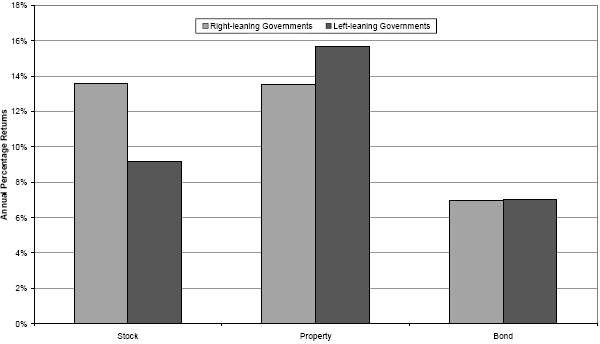Are “hands-off” (right-leaning) governments better for stocks than “hands-on” (left-leaning) governments? In their recent paper entitled “Investment Returns Under Right- and Left-Wing Governments in Australasia”, Hamish Anderson, Christopher Malone and Ben Marshall examine the effect of ruling party orientation on inflation, and thereby on stock, property and bond returns, in Australia and New Zealand. Using monthly, annual and political-term data as available across the period 1910-2006, they find that:
- Inflation tends to be higher during left-leaning governments. In Australia (New Zealand), the average annual inflation rate is 3.93% (4.81%) under right-leaning governments and 5.13% (5.31%) under left-leaning governments.
- Stocks tend to do better under right-leaning governments. In Australia (New Zealand), the average annual return on stocks is 13.52% (13.67%) under right-leaning governments and 9.76% (8.58%) under left-leaning governments. After detrending with worldwide stock returns, annual average returns in Australia (New Zealand) are 11.95% (10.18%) under right-leaning governments and 4.94% (6.60%) under left-leaning governments. The right versus left difference is robust for annual and term-based (rather than monthly) returns in Australia, but not in New Zealand.
- There is no clear political cycle for total bond returns. In Australia (New Zealand), the average annual return on bonds is 6.38% (7.93%) under right-leaning governments and 7.24% (6.80%) under left-leaning governments. Bonds generally produce higher real returns during right-leaning governments. They tend to accrue capital gains (losses) during right-leaning (left-leaning) governments.
- Real estate returns tend to be a little higher during left-leaning governments. In Australia (New Zealand), the average annual return on property is 15.53% (12.16%) under right-leaning governments and 14.87% (16.52%) under left-leaning governments. Any right versus left difference dissipates when using annual and term-based (rather than monthly) returns.
The following chart, taken from this paper, summarizes the behaviors of asset returns for Australia and New Zealand combined during right-leaning and left-leaning governments, based on monthly returns. It shows that stocks tend to outperform under right-leaning governments, while real estate (property) tends to outperform under left-leaning governments.

In summary, investors should perhaps lean toward stocks (real estate) when the electorate leans to the right (left).
Note that the authors do not address any lag between taking office and policy implementation, which seems potentially important for political regime switches.